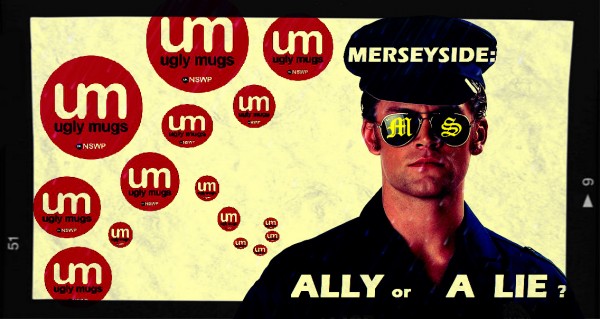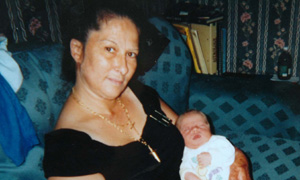
In Merseyside, England, violence against sex workers is treated by the police as a hate crime. This means that when a sex worker is the victim of an assault, robbery, or rape, she or he can report the incident without fear of being charged with prostitution, because the police have agreed to place a higher priority on convicting the criminals who harm sex workers over criminalizing sex workers.
Though violence against sex workers is not officially defined as a hate crime in written legislation or national law, the Merseyside police have adopted this term to mean an internal policy of giving enhanced services to help sex workers, directing additional resources towards people whom they believe are particularly vulnerable to crime due to social prejudice.
Working in partnership with sex workers’ projects, including the Armistead Street Project and the UK Network of Sex Work Projects, the Merseyside Police designate special police liaisons who communicate laterally with sex workers’ organizations. Through these organizations and other public outreach efforts, sex workers are encouraged to share Ugly Mugs with the police, describing perpetrators of harm whether they be a bad client, a street thug, a pimp, or someone they know. There’s also an Independent Sexual Violence Advisor (ISVA), a social worker whose job it is to look after the needs of the victims of crime, making sure that the sex workers receive care and are comfortable with the criminal justice process.
It was a sex worker-led effort in 2006 that led to this internal policy change within the Merseyside Police Department. After the 2005 murder of Anne Marie Foy, who sustained over 60 bodily injuries during an assault on the job, sex workers’ organizations in Liverpool strategized to change this situation. Prior to Foy’s murder, six other sex workers were killed in Liverpool between 2000 and 2005.

Sex worker activists protested that such violence is unacceptable. Rosie Campbell, a member of UKNSWP and a sociologist who has researched sex work for 17 years, was one of the most vocal advocates for the Merseyside Model. Others after her followed suit, including some very unlikely allies, such as Andrew Boff, a gay Conservative politician on the London Assembly who published an in-depth research project entitled “Silence On Violence” in support of the Merseyside Model, and an abolitionist fiction writer and charity organizer, Ruth Jacobs, who has made it her mission to get the Merseyside Model incorporated by all police departments in the UK.
As a result of this shift in policing strategies in Liverpool, the rate of conviction for crimes against sex workers rose dramatically to 83%, whereas the national average of such convictions in the UK is only 6.5%. Within only 18 months of the implementation of the hate crime policy in 2006, sex workers increased their reporting of violent crimes by 400%. Besides reducing individual acts of violence against sex workers, this shift in priorities also reduces systemic violence, by sending a message to society at large that the unique oppression faced by sex workers is not acceptable.
According to a 1995 study by criminologist J. Lowman, at Simon Fraser University in British Columbia, sex workers are 60 to 120 times more likely to become a victim of homicide. This is in part because there is a popular perception that sex workers make easy targets since they would not report a crime committed against them for fear of conviction of prostitution or, in legalized environments, for fear of stigma. Labelling violence against sex workers hate crime and encouraging the reporting of such crimes results in an increase of the reporting of such crimes, which changes the “easy targets” perception, and reduces the incidence of such crimes, creating a positive feedback loop.
Due to the success of the Merseyside policing model in Liverpool, there is a push for the adoption of these policies within other police departments across the UK. It may seem surprising that Boff, who was almost elected mayor of London twice, and works closely with the current mayor, is coming out strongly in support of making violence against sex workers a hate crime. But his recent op ed piece in the Huffington Post demonstrates that he is fully willing to put his name and his political influence behind the cause.
“Using the term ‘hate crime’ is not about giving any group special treatment,” Boff wrote. “In fact, usually the groups in this category are those who have historically received worse treatment from the police.” Acknowledging the historic role of the police in perpetrating violence against sex workers, Boff goes on to proclaim that defending sex workers for violence is a public good, beneficial to everyone in society. “Criminals often target sex workers and other ‘hate crime’ groups, before moving on to the wider public. Two of the most notorious serial killers, Peter Sutcliffe and Gary Leon Ridgway initially murdered sex workers before targeting other women. So if we can get sex workers to report crimes, everyone gains.”
Boff cites sex work activists and academics such as Rosie Campbell, the English Collective of Prostitutes, and Laura Agustín in his report, demonstrating that he is well-read in movement literature and is aware of the popular misconceptions that conflate sex trafficking victims with migrant sex workers.

Citing Guardian journalist Nick Davies, a former UK Journalist of the Year who writes about falsehood and distortion in the media, Boff shows that Operation Pentameter One and Two, the first national police operations to rescue trafficked women and children, which were “hailed as a success” actually “accomplished worryingly little”:
“The results: Failure to find a single trafficker who forced women into prostitution. Operation Pentameter Two claimed to have carried out 822 raids on brothels; identified possible ‘victims’…and arrested 528. However after an arduous legal battle, the Guardian managed to obtain an analysis, marked restricted, by the police’s Human Trafficking Centre in Sheffield. The document revealed that, after 822 raids, no sex trafficker, by international definitions, had been found. And, after 822 raids, only 15 men and women were convicted of non-coerced ‘trafficking’ under the definition from the UK’s 2003 Sex Offences Act. 76 women and men were convicted of non-trafficking offences involving drugs or brothel laws. 73 were charged with immigrant breaches. Only 5 men were convicted of importing women and forcing them to work as prostitutes during this time – however these cases had come to light prior to the Operation Pentameter’s raids. Of the 167 so-called ‘victims,’ only 11 were found to be genuine victims who wanted or required police help.”
Does this mean that Andrew Boff, the Conservative Londonwide politician, is a good ally for sex workers? According to Frances Kendall, who wrote “How to be an ally if you are a person with privilege,” the answer would be yes. Boff seeks to develop an in-depth understanding of arguments made by sex worker activists, promotes inclusiveness with a model that partners police with sex worker projects, aligns himself publicly and privately with activists, and articulates patterns of oppression against sex workers by designating them as an especially vulnerable group, deserving of hate crime protections. In the words of Kendall, “Allies know that, in most empowered and genuine ally relationships, the person of privilege initiates the change towards personal, institutional, and society justice and equality.” Boff is using his privilege and political influence to improve living conditions for sex workers.
However, on the NSWP (Global Network of Sex Work Projects) facebook message board, where I posted Boff’s article, I was surprised to receive many criticisms from long-time sex worker activists such as Tracey Tulley and Maxine Doogan, and academics such as Jennifer Reed, who are suspicious of Boff because he is someone from outside the sex worker community who tries to speak for sex workers. This suspicion is not without good reason, as there are many abolitionist activists who claim to speak for our benefit, but actually advocate for policies that harm us, and subject us to greater indignities and structural violence. In defense of sex worker self-determination and self-representation, it is important that we, within the activist and academic research community, are in clear communication with Boff, so we know the extent to which he acts as an ally, and can speak up if he says things that are harmful to sex workers.
Furthermore, the use of policing and criminalization for social justice aims should always be taken with a grain of salt, as reinforcing the prison industrial complex has tended to exacerbate discrimination along racial and class lines. Though the Merseyside hate crime designation is not a law, but an internal police department policy, we should remain critical of any legislation that may promote enhanced policing and criminalization. We should be wary of the “Ugly Mug” approach, in that it could, in effect, resemble the End Demand approach of criminalizing purchasers of sex; we have to make sure that the information we give to the police is not used against us, or used to target clients who have not committed acts of violence. In the end, what matters most is evidence-based research of the effects on the ground; the way a policy is implemented can be more important than the policy itself, and it will be our responsibility, in the sex worker movement, to continually monitor the impact of these policy projects and maintain lateral relationships of partnership and self-representation with the law.
Now this is comprehensive Great reporting, unfortunately a rarity when it comes to our class.
I just wanted to say Maxine, you are so cool to make this reply to an article that you could have seen as being critical of you. It’s not the first time I have seen you engage in such a constructive way. You are a really excellent activist.
Thanks so much for writing this. I’ve been meaning to read more about Merseyside!
I lived in Merseyside until 2010. We might call it “the Merseyside Model”, but it does come with lots of raids on brothels. Especially well-established ones. Can’t think of one that’s been open more than a few years.
Interesting to compare to Greater Manchester (the neighbour) where streetwalkers suffer badly, but there are lots of well-established parlours that are tolerated by the police (and, in some cases, have been for 20 years or more).
London combines the worst of both, mind.
How do you think the Merseyside Model directly contributes to raids on brothels? Isn’t that just the result of British laws vs. third parties in prostitution (which should definitely be abolished–Canada is working on abolishing similar laws right now in their Supreme Court, and a recent Canadian study shows that third parties in the industry contribute to sex workers’ security http://www.healthcanal.com/public-health-safety/37805-uottawa-researchers-highlight-sex-industry-%E2%80%9Cthird-parties%E2%80%9D-and-sex-worker-safety.html )
Depends what you mean by “the Merseyside Model” – if you mean “treating crime against prostitutes as a hate crime” then it doesn’t; if you mean “the overall way that Merseyside police deal with prostitution” then the fact is that Merseyside police raid brothels a lot more than Greater Manchester police.
GM police just don’t enforce the law on brothel-keeping against well-run brothels in commercial premises that close before 10pm. Merseyside police do, which means that the top-end parlours don’t exist in Merseyside, just the shoddy fly-by-night ones.
Congratulations for this excellent piece. Don’t worry about criticism until it comes from reputable sources – which are hard to identify in the currrent landscape of opaquely funding of ‘activism’ and its even more opaque cousin, social media. In other words, don’t look to the NSWP facebook page as a forum for genuine, well informed sex workers rights activists. Certainly don’t be deterred from publishing this incredibly important info everywhere you can. (nb I also expressed concerns about allying with cops and social workers when I first heard of this adaptation of the Ugly Mugs)
Congratulations for this excellent piece. Don’t worry about criticism until it comes from reputable sources – which are hard to identify in the currrent landscape of opaquely funded ‘activism’ and its even more opaque cousin, social media. In other words, don’t look to the NSWP facebook page as a forum for genuine, well informed sex workers rights activists. Certainly don’t be deterred from publishing this incredibly important info everywhere you can. (nb I also expressed concerns about allying with cops and social workers when I first heard of this adaptation of the Ugly Mugs)
I never realized there were no sex workers who could write in the whole of the UK. Will this be followed up by a white american writing about India?
Hi, Jemima,
Thanks so much for offering to contribute. We are always seeking international writers. Please contact us to talk about reporting from the U.K.